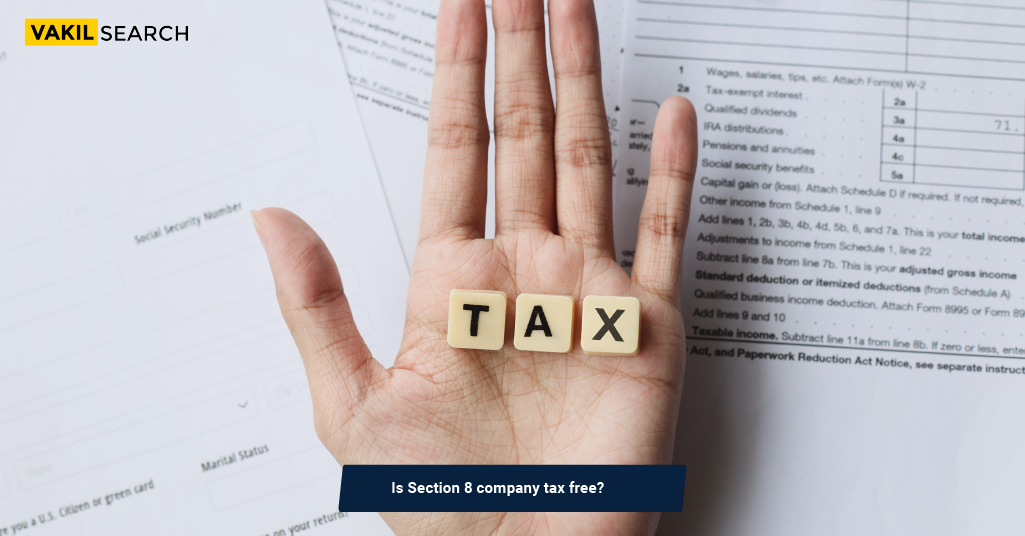Understand the tax benefits of Section 8 companies in India, promoting philanthropy and enabling efficient fund allocation for impactful social causes.
Introduction
In India, Section 8 companies, as the name suggests, operate under Section 8 of the Companies Act, 2013. These companies are registered as non-profit organisations (NPOs) with the primary objective of promoting commerce, art, science, sports, education, research, social welfare, religion, and charity. The key aspect that often piques interest is whether Section 8 companies enjoy tax exemption. In this article, we will delve into the Section 8 Company Tax, exploring their tax benefits and comparing them with other corporate structures prevalent in India.
Understanding Section 8 Company Tax Structure
-
Tax Exemption Under Section 12AA and 80G
Section 8 companies can apply for tax exemption under Section 12AA of the Income Tax Act, 1961. Once granted, the organisation becomes eligible for various exemptions under Section 11 and Section 12 of the Income Tax Act. Donors to such organisations can also claim deductions under Section 80G of the Income Tax Act for the donations made.
-
Exemption on Income Earned
Any income that a Section 8 company earns from its activities, primarily used for the advancement of its objectives and not for profits, is exempted from taxation. This ensures that the earnings are reinvested in the organisation’s cause without being burdened by tax liabilities.
-
Tax on Surplus or Profits
Section 8 Company Tax – In case the Section 8 company generates surplus or profits beyond a specified limit, which is currently 15% of the income, it will be subject to a tax rate of 30% plus surcharge and cess. However, if the surplus is within the permissible limit, it can be accumulated and utilised for the organisation’s objectives without any tax liability.
Benefits of Tax Exemption for Section 8 Companies
-
Encouragement for Philanthropy
Tax exemption acts as a powerful motivator for individuals and entities to contribute to Section 8 companies. When people know that their donations are tax-deductible, they are more inclined to support causes and initiatives.
-
Optimal Utilisation of Funds
Tax exemption on the income generated by Section 8 companies allows them to channelise the funds efficiently towards their objectives, ensuring maximum impact and reach for their projects and activities.
-
Enhanced Credibility
Having tax-exempt status enhances the credibility of Section 8 companies. Donors often seek organisations with such status, knowing that their contributions will be utilised judiciously for the intended purposes.
Comparing Tax Benefits with Other Corporate Structures
-
Private Limited Company
Private limited companies are taxed at a flat rate of 25% on their taxable income. They do not have the same exemptions and deductions as Section 8 companies, which may affect the overall funds available for their initiatives.
-
Limited Liability Partnership (LLP)
LLPs are taxed at a flat rate of 30% on their taxable income. However, they do not enjoy the tax benefits and exemptions like Section 8 companies. This can impact their financial resources available for charitable or non-profit activities.
-
Partnership Firm
Partnership firms are taxed at the rate applicable to the partners. They don’t have separate legal entities, and hence, taxation is based on the individual partners’ tax slabs. Tax benefits may not be as pronounced compared to Section 8 companies.
Exploring Tax Compliance for Section 8 Companies
-
Annual Compliance Requirements
Section 8 companies, despite their tax exemptions, must adhere to specific annual compliance requirements. This includes filing annual returns, maintaining books of accounts, and adhering to regulatory guidelines. Complying with these requirements is essential to retain the tax-exempt status and ensure TDS Filing.
-
Impact of Non-Compliance on Tax Benefits
Failure to comply with the annual requirements and guidelines set forth for Section 8 companies can lead to the revocation of tax exemptions. Non-compliance can result in the organisation losing its tax benefits, making it crucial to ensure adherence to the compliance obligations.
Section 8 Company Tax: Harnessing Tax Savings for Social Impact
-
Reinvestment for Greater Social Causes
Tax savings from exemptions can be reinvested into the organisation’s initiatives. These savings empower Section 8 companies to scale up their projects, reach a wider audience, and contribute more effectively to their chosen social causes.
-
Strategic Planning for Maximum Tax Efficiency
Section 8 companies can strategically plan their financial activities to maximise tax efficiency. This may involve careful structuring of projects and income to ensure that the organisation falls within the tax-exempt thresholds while effectively utilising available funds for its objectives.
Conclusion
Section 8 companies in India enjoy significant tax benefits, making them an attractive choice for those aiming to make a difference in various sectors without the burden of heavy taxation. The tax exemption provisions under Sections 12AA, 80G, and other related sections of the Income Tax Act motivate donors and provide these organisations with the financial support needed to fulfil their objectives.
Vakilsearch, a leading legal consulting platform, plays a crucial role in aiding Section 8 companies to navigate the legal landscape. We provide essential guidance and assistance in obtaining and maintaining the Section 8 Company Tax-exempt status, ensuring compliance with the relevant provisions. This support allows Section 8 companies to focus on their core objectives without getting entangled in legal complexities.




